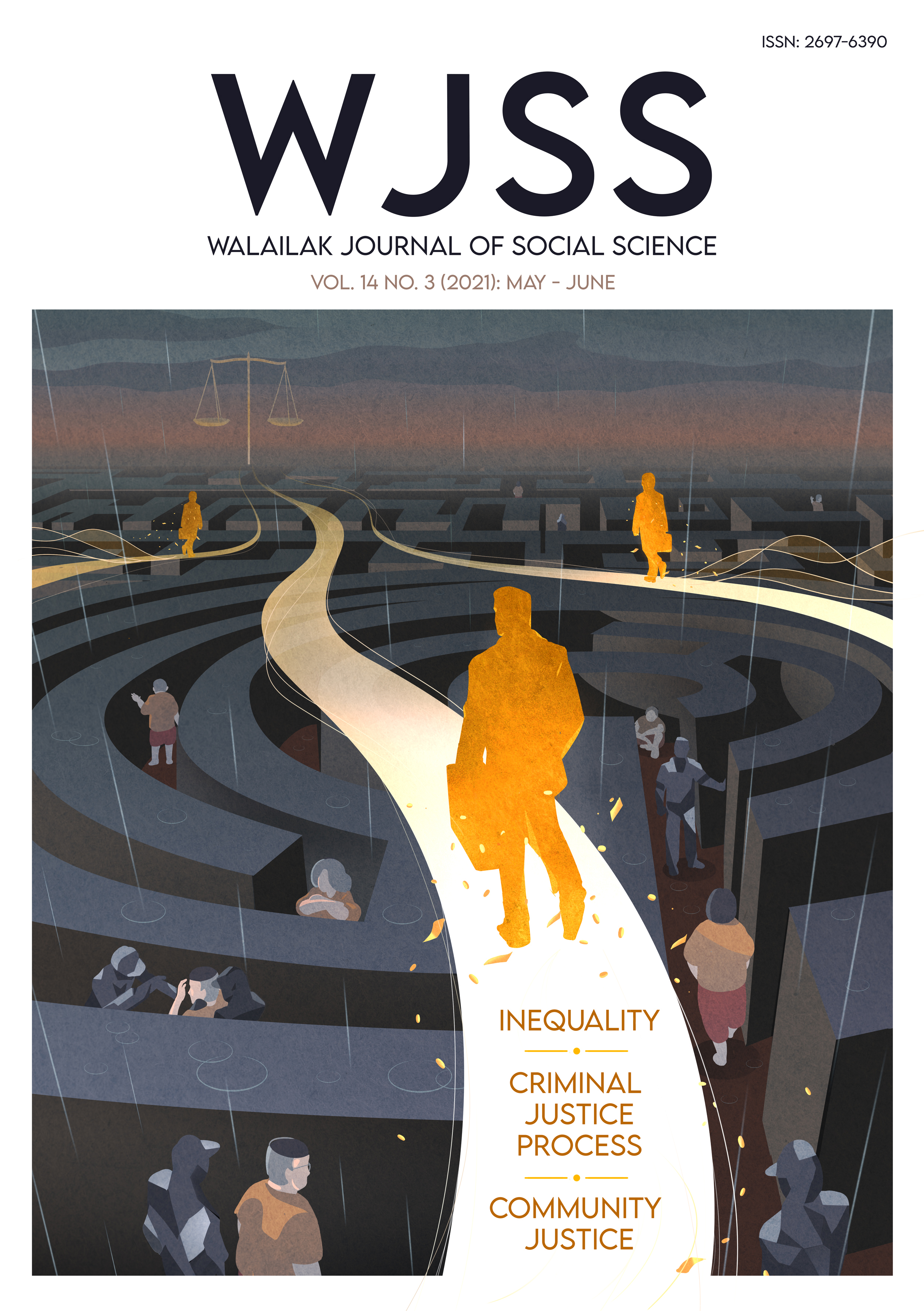An Inequality Reduction in Accessing Thai Criminal Justice Process by Community Justice Approach
Main Article Content
Abstract
An inequality reduction in accessing to justice in Thai society through community Justices is a qualitative research whose aim is to explore possible approaches to employ the concept of community justice to effectively minimize unequal access to justice in Thai society. This research put together data obtained from the government officers in the ministerial level, provincial community justice agencies and community justice centers. The research finds that poverty, insufficient or false legal knowledge, abusive use of legal knowledge and power, absence of people’s participation in the justice process and limitations in other aspects, are the five main causes of inequality of access to justice. Moreover, the community justice process is able to minimize inequality of access to justice in Thai society through the preventive approach, which includes the provision of proper legal knowledge and sufficient assistance after a problem is occurred. Community justice process allows people in all areas of the country to be granted the justice they are fundamentally entitled to and access to fair services from the agencies in the justice process. The access to such service must be easy, convenient, fast, economical, and equal. The problems and obstacles from the incorporation of community justice approach to eliminate unequal access to justice include the lack of laws to enforce the process of community justice, the potential of the committees controlling the operation of community justice centers and community justice network, the absence of well-developed and effective mediation as well as the lack of effective enforcement of mediation outcomes. An appropriate and contextually derived developmental approach of community justice’s system and operation to minimize inequality of access to justice in Thai society encompasses the determination of the management mechanism of provincial community justice office. Community justice centers should be categorized according their strength, while the exchange of knowledge between community justice centers and community justice network should be encouraged. The potential of new body of knowledge should be reinforced while existing body of knowledge should be constantly revised and improved. The reform of the structure of community justice centers is also crucial while agencies within the justice process should carry out visits to stay informed about current situations and problems people in local communities are facing.
Article Details
Copyright: CC BY-NC-ND 4.0
References
Duriyaprakit, K. (2011). The Expectation of Community Justice System towards the Implementation of the Justice Center community in Bangkok (Master’s thesis). Bangkok, Thailand: Thammasat University.
Kittayarak, K., & Uaamnoey, J. (2007). Future justice system and peace in society and communities. Restorative justice process. Bangkok, Thailand: The Agricultural Cooperative Federation of Thailand.
Kittayarak, K. (2007). Community’s justice: Role of providing justice, by community, for community. Bangkok, Thailand: Thailand Research Funds (TRF).
Kuntee, P. (2010). Criminological theory: Principle, research and policy implication. Bangkok, Thailand: Sunate Films.
Naesngkham, W. (2016). The access to criminal justice system for ethnicities. Bangkok, Thailand: Institute for Justice Research and Development.
Office of the Permanent Secretary, Ministry of Justice. (2015). Justice stories. Bangkok, Thailand: National Buddhist Department Printing.
Office of Justice Affairs (2009). Thailand’s criminal justice process. Bangkok, Thailand: Ministry of Justice.
Rattanasakalwong, K., & et al. (2008). The discrepancy in the administration of criminal justice in urban and rural communities (Research report). Bangkok, Thailand: Dhurakij Pundit University.
Rujiprak, V., & Limprasert, S. (2015). Public network participation in preventing special cases of crime. Journal of Thai Justice System, 8(1), 41-65.
Saengda, W. (2016). The access to the criminal justice system of ethnic groups. Bangkok, Thailand: Institute for Justice Research and Development.
Strategy and Planning Division, the Permanent Secretary for Ministry of Justice. (2014). The justice policy based on the public needs. Bangkok, Thailand: Strategy and Planning Division, the Permanent Secretary for Ministry of Justice.
Suvanrak, B. (2016). The administration of justice to reduce inequality in society. Bangkok, Thailand: Ministry of Justice.
Thammasat University Research and Consultancy Institute. (2014). The complete report of the pilot justice provincial office establishment evaluation project fiscal year B.E. 2557. Bangkok, Thailand: Justice Community Development Office under, Ministry of Justice.
Uaamnoey, J. (2007). Criminal justice: Providing the community space for criminal justice administration. Bangkok, Thailand: The Thailand Research Fund.
Watanavibool, A., Borwornnuntakul, T., Kanyajit, S., & Sanitphot, P. (2006). The operation for improving and developing the access to public criminal justice system. Institute for Justice Research and Development, Office of Justice Affairs, Ministry of Justice in cooperation with the Faculty of Social Sciences and Humanities, Mahidol University, Thailand.
Ministry of Justice. (2017). The draft of the community justice act B.E. Retrieved from http://www.moj.go.th/files/moj/20170601103536_71994.pdf
Woranam, J., Lowatcharin, G., & Musikaboonlert, K. (2019). Exploring conditions conducive to successful operation of community justice centers in Khon Kean province. Journal of Social Work, 27(2), 163-193.
Uaamnoey, J. (2005). Restorative justice in prison in the past and current situation. Journal of Criminology, 3, 3-7.


